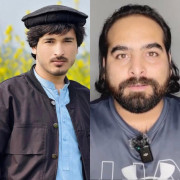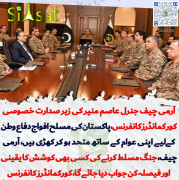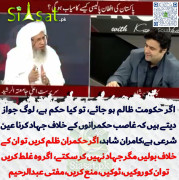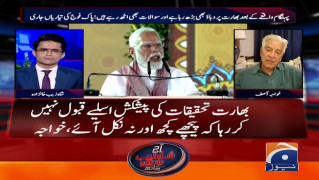http://www.humanrights.asia/opinions/columns/pdf/AHRC-ETC-022-2011-01.pdf
Minorities :‘Us and them’ – what divides Pakistani identity
By Shayan Naveed
Published: June 9, 2011
KARACHI:
The last two years have seen an alarming rise in terror attacks against minority communities and their advocates in Pakistan.
The year 2010 ended with violent protests over amendments to the controversial blasphemy laws, and 2011 opened with the assassination of former Punjab Governor Salmaan Taseer. This was followed closely by the murder of former minister for minorities Shahbaz Bhatti.
In a recently released report titled “A question of faith”, non-profit public policy organisation Jinnah Institute analyses, rather questions, the part the Pakistani state as well as Pakistanis play in legal discrimination against and social persecution of minority members.
“The events of 2010-11 have not occurred in a vacuum and are not atypical of Pakistani reality. These most recent attacks on religious minorities and the state’s tolerance towards this persecution are part of a long-term pattern of state complicity at all levels – judicial, executive and legislative,” the report says.
In a place as volatile as Pakistan, fighting extremism is not just about defeating the Taliban, the report suggests. It is about “departing from the sectarian ideology and oppressive legal frameworks that embolden militants”.
The report goes on to state that if the situation is to change, “transformative corrective action has to be taken by the Pakistani state to encourage an inclusive and equitable Pakistani identity.”
The report goes on to provide key recommendations urging the Pakistan government to, firstly, repeal the blasphemy law – a subject that has been at the centre of controversy, especially since the case of Christian blasphemy convict Aasia Bibi.
According to the institute, Aasia continues to languish in an isolation cell and has expressed sadness over the violent death of Taseer and Bhatti – her most vocal supporters.
The institute says the report’s findings confirm the legislature, executive and judiciary have historically played a role in creating a rift in the identity of the state, which is defined by whether a person is Muslim or non-Muslim.
The neglect of minority issues, it further states, has created increased physical insecurity among minorities apart from increased social vulnerability such as lack of access to education, jobs and health care. “Inconsistent state protection, successive constitutional amendments and implementation of controversial legislation such as the blasphemy laws provide minimal protection and have added to their social exclusion and vulnerability,” the report says.
Focusing mainly on Christians, Hindus and Ahmadis, researchers interviewed 125 people including minority representatives, victims, and members of civil society in 20 cities between December 2010 and March 2011.
The report points out that although Ahmadis in Pakistan do not consider themselves a minority, the state has “forced minority status upon them”.
According to the institute, maulvis incite violence in their sermons and in the media, resulting in increasing violence against Ahmadis over the past three years.
The most prominent of such incidents occurred on May 28, 2010, when armed gunmen attacked two Ahmadi places of worship in Lahore, killing over 88 people. According to the report, there has still been no official investigation in to the attacks. “Despite this, all the people we spoke to at Rabwa keep an optimistic outlook and reiterate their commitment to Pakistan with their motto ‘Love for all, hatred for none’,” the report states. Hair-raising incidents of persecution against Christians have come into the limelight, but any legal action or official condemnation is yet to take place.
On July 31, 2009, a mob attacked Christian homes in Gojra, Punjab, setting fire to 60 houses and killing eight Christians. According to the report, victims’ families recently withdrew their case against 150 alleged perpetrators of the attacks. On June 7, 2011, all accused were released on bail and criminal cases were closed by an anti-terrorist court in Faisalabad “for want of evidence and continuous absence of complainants and eye-witnesses.”
The report states that according to the director of Lahore-based NGO Community Development Initiative Asif Aqeel, the most serious cases of persecution faced by Christians today are seen in Punjab.
According to Baanh Beli, a NGO based in Tharparkar, 80% of the Hindus living in interior Sindh are agriculture labourers and victims of caste and wider religious discrimination, the report states.
The remaining 20% are from higher castes, but they face a different set of problems, such as security issues due to an increase in kidnappings for ransom. Lakki Chand Garji, 82, considered to be one of Pakistan’s most revered Hindu spiritual leaders, was kidnapped in Balochistan by a gang of armed men on December 21, 2010, and is yet to be traced and rescued, the report states.
“It is evident that the security and status of Hindus in Pakistan is influenced at a certain level by what happens across the border in India,” the report further states.
In the report, Hindu residents in Karachi recounted how their homes and temples were attached by angry Muslim mobs. “It was almost as if the Hindu community in Pakistan was seen as an extension of the Indian state,” it states.
Although migration by Pakistani Hindus is on the rise, the report states that everyone they interviewed did not want to leave the country, even if they felt they needed to. “One Hindu resident of Nagarpakar who had spent one year as a missing person accused of being an Indian agent, court-martialled and finally released as it was that the charges against him were fabricated, when asked if he would migrate to India told us, ‘I am committed to this land. My heart says leave Sindh for hind, but I can’t’,” the report states.
The report concludes by urging the government to bring policy reform with reference to challenges faced by religious minorities in Pakistan.
Some key recommendations
Repeal the blasphemy law. In the event that the government is unable to repeal the law, it must begin by taking all appropriate measures to prevent misuse of the law.
Adding a section in the PPC that makes advocacy of religious hatred or incitement to discrimination or violence a punishable offence.
Remove impunity in a systematic manner for prayer leaders in mosques
Engage in police reform and provide training to law enforcement agencies to ensure that these agencies seek to protect rather than abuse vulnerable groups.
Engage in judicial reform and training to ensure that the judiciary, particularly at the district level, addresses bigotry within its ranks and seeks to dispense rights-respecting justice.
Clarify and resolve the status of state bodies such as the Federal Shariat Court and the Council of Islamic Ideology that have been used by extremist actors within the Pakistani state system to provide legal cover to discrimination and abuse.
Waqqas, Christian
Farzana and Pervez Masih, residents of Akhtar colony in Karachi told us about their sixteen-year-old son Waqqas. He was abducted, raped, tortured and murdered by a local police constable in January 2011.
Waqqas is not the only Christian victim of his kind. The family is convinced that Christian young men like their son are easy targets for this type of crime. The police rarely take investigations against crimes against minority communities seriously and often no legal action is taken against the perpetrators.
Roop Chand Bheel, Hindu
Roop Chand Bheel, 22, a labourer, was burnt alive by his Muslim landlord, Mir Abdul Rehman Talpur in Mirpur Khas. He was accused of stealing cotton and was detained by the landlord. His uncle said, “First he was buried in the ground up to the waist and gashed on different parts of the torso with a sharp-edged object. Then he was pulled out, and an attempt was made to burn him to death. Chand was taken to Karachi for treatment, but died after three days. His family lodged an FIR at the Kot Ghulam Mohammad police station. Although, the other men involved in the crime were arrested, the landlord remains at large.
SOURCE: Jinnah Institute report
Published in The Express Tribune, June 9th, 2011.
Minorities :‘Us and them’ – what divides Pakistani identity
By Shayan Naveed
Published: June 9, 2011
KARACHI:
The last two years have seen an alarming rise in terror attacks against minority communities and their advocates in Pakistan.
The year 2010 ended with violent protests over amendments to the controversial blasphemy laws, and 2011 opened with the assassination of former Punjab Governor Salmaan Taseer. This was followed closely by the murder of former minister for minorities Shahbaz Bhatti.
In a recently released report titled “A question of faith”, non-profit public policy organisation Jinnah Institute analyses, rather questions, the part the Pakistani state as well as Pakistanis play in legal discrimination against and social persecution of minority members.
“The events of 2010-11 have not occurred in a vacuum and are not atypical of Pakistani reality. These most recent attacks on religious minorities and the state’s tolerance towards this persecution are part of a long-term pattern of state complicity at all levels – judicial, executive and legislative,” the report says.
In a place as volatile as Pakistan, fighting extremism is not just about defeating the Taliban, the report suggests. It is about “departing from the sectarian ideology and oppressive legal frameworks that embolden militants”.
The report goes on to state that if the situation is to change, “transformative corrective action has to be taken by the Pakistani state to encourage an inclusive and equitable Pakistani identity.”
The report goes on to provide key recommendations urging the Pakistan government to, firstly, repeal the blasphemy law – a subject that has been at the centre of controversy, especially since the case of Christian blasphemy convict Aasia Bibi.
According to the institute, Aasia continues to languish in an isolation cell and has expressed sadness over the violent death of Taseer and Bhatti – her most vocal supporters.
The institute says the report’s findings confirm the legislature, executive and judiciary have historically played a role in creating a rift in the identity of the state, which is defined by whether a person is Muslim or non-Muslim.
The neglect of minority issues, it further states, has created increased physical insecurity among minorities apart from increased social vulnerability such as lack of access to education, jobs and health care. “Inconsistent state protection, successive constitutional amendments and implementation of controversial legislation such as the blasphemy laws provide minimal protection and have added to their social exclusion and vulnerability,” the report says.
Focusing mainly on Christians, Hindus and Ahmadis, researchers interviewed 125 people including minority representatives, victims, and members of civil society in 20 cities between December 2010 and March 2011.
The report points out that although Ahmadis in Pakistan do not consider themselves a minority, the state has “forced minority status upon them”.
According to the institute, maulvis incite violence in their sermons and in the media, resulting in increasing violence against Ahmadis over the past three years.
The most prominent of such incidents occurred on May 28, 2010, when armed gunmen attacked two Ahmadi places of worship in Lahore, killing over 88 people. According to the report, there has still been no official investigation in to the attacks. “Despite this, all the people we spoke to at Rabwa keep an optimistic outlook and reiterate their commitment to Pakistan with their motto ‘Love for all, hatred for none’,” the report states. Hair-raising incidents of persecution against Christians have come into the limelight, but any legal action or official condemnation is yet to take place.
On July 31, 2009, a mob attacked Christian homes in Gojra, Punjab, setting fire to 60 houses and killing eight Christians. According to the report, victims’ families recently withdrew their case against 150 alleged perpetrators of the attacks. On June 7, 2011, all accused were released on bail and criminal cases were closed by an anti-terrorist court in Faisalabad “for want of evidence and continuous absence of complainants and eye-witnesses.”
The report states that according to the director of Lahore-based NGO Community Development Initiative Asif Aqeel, the most serious cases of persecution faced by Christians today are seen in Punjab.
According to Baanh Beli, a NGO based in Tharparkar, 80% of the Hindus living in interior Sindh are agriculture labourers and victims of caste and wider religious discrimination, the report states.
The remaining 20% are from higher castes, but they face a different set of problems, such as security issues due to an increase in kidnappings for ransom. Lakki Chand Garji, 82, considered to be one of Pakistan’s most revered Hindu spiritual leaders, was kidnapped in Balochistan by a gang of armed men on December 21, 2010, and is yet to be traced and rescued, the report states.
“It is evident that the security and status of Hindus in Pakistan is influenced at a certain level by what happens across the border in India,” the report further states.
In the report, Hindu residents in Karachi recounted how their homes and temples were attached by angry Muslim mobs. “It was almost as if the Hindu community in Pakistan was seen as an extension of the Indian state,” it states.
Although migration by Pakistani Hindus is on the rise, the report states that everyone they interviewed did not want to leave the country, even if they felt they needed to. “One Hindu resident of Nagarpakar who had spent one year as a missing person accused of being an Indian agent, court-martialled and finally released as it was that the charges against him were fabricated, when asked if he would migrate to India told us, ‘I am committed to this land. My heart says leave Sindh for hind, but I can’t’,” the report states.
The report concludes by urging the government to bring policy reform with reference to challenges faced by religious minorities in Pakistan.
Some key recommendations
Repeal the blasphemy law. In the event that the government is unable to repeal the law, it must begin by taking all appropriate measures to prevent misuse of the law.
Adding a section in the PPC that makes advocacy of religious hatred or incitement to discrimination or violence a punishable offence.
Remove impunity in a systematic manner for prayer leaders in mosques
Engage in police reform and provide training to law enforcement agencies to ensure that these agencies seek to protect rather than abuse vulnerable groups.
Engage in judicial reform and training to ensure that the judiciary, particularly at the district level, addresses bigotry within its ranks and seeks to dispense rights-respecting justice.
Clarify and resolve the status of state bodies such as the Federal Shariat Court and the Council of Islamic Ideology that have been used by extremist actors within the Pakistani state system to provide legal cover to discrimination and abuse.
Waqqas, Christian
Farzana and Pervez Masih, residents of Akhtar colony in Karachi told us about their sixteen-year-old son Waqqas. He was abducted, raped, tortured and murdered by a local police constable in January 2011.
Waqqas is not the only Christian victim of his kind. The family is convinced that Christian young men like their son are easy targets for this type of crime. The police rarely take investigations against crimes against minority communities seriously and often no legal action is taken against the perpetrators.
Roop Chand Bheel, Hindu
Roop Chand Bheel, 22, a labourer, was burnt alive by his Muslim landlord, Mir Abdul Rehman Talpur in Mirpur Khas. He was accused of stealing cotton and was detained by the landlord. His uncle said, “First he was buried in the ground up to the waist and gashed on different parts of the torso with a sharp-edged object. Then he was pulled out, and an attempt was made to burn him to death. Chand was taken to Karachi for treatment, but died after three days. His family lodged an FIR at the Kot Ghulam Mohammad police station. Although, the other men involved in the crime were arrested, the landlord remains at large.
SOURCE: Jinnah Institute report
Published in The Express Tribune, June 9th, 2011.
Last edited:


























